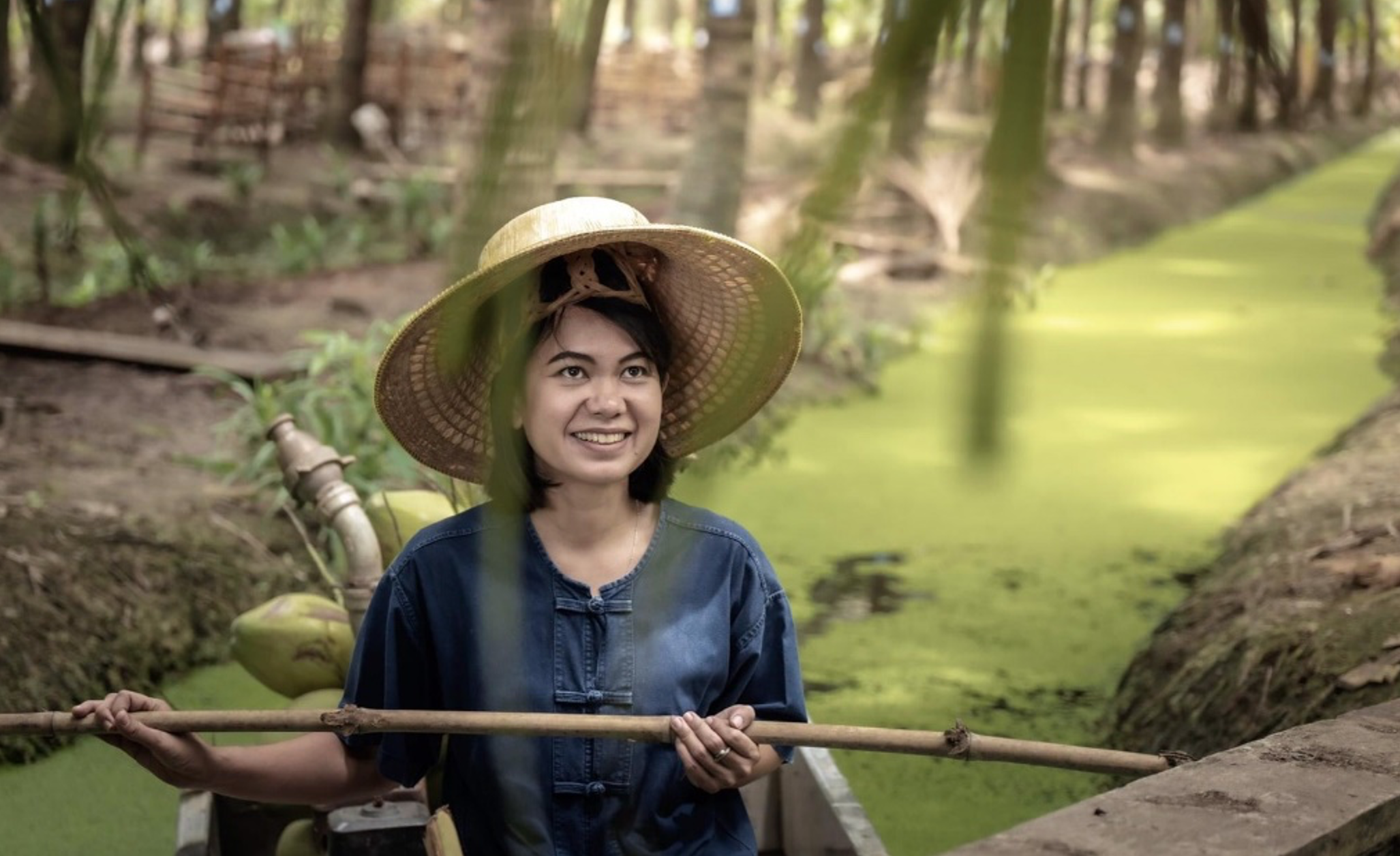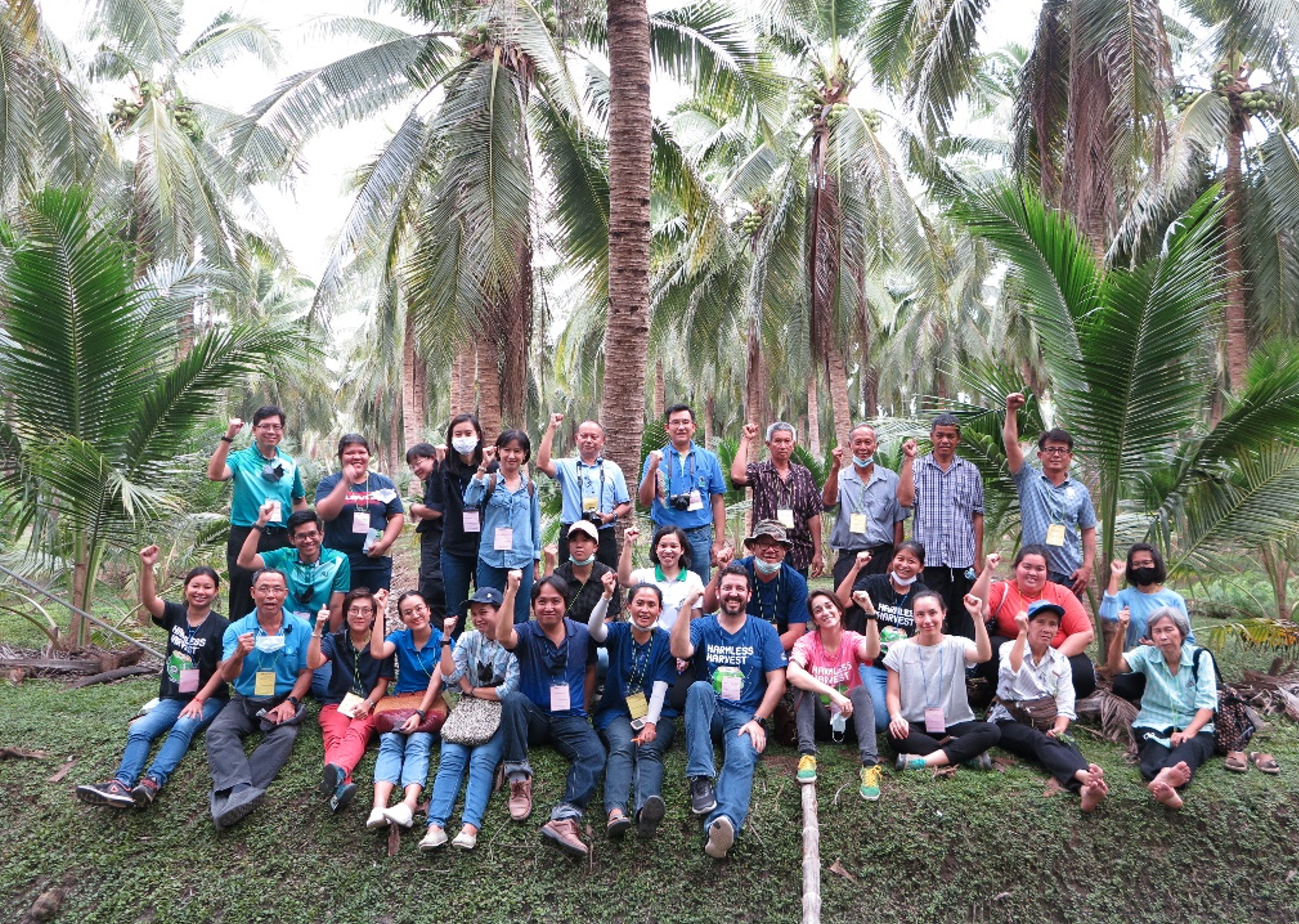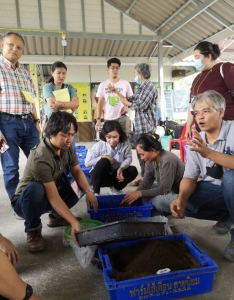The ReCAP Project: Growing climate and farmer friendly coconuts that happen to be oh-so-delicious!
 Nuanla-or working on her coconut farm, © Nuanla-or Dherdkiattikun
Nuanla-or working on her coconut farm, © Nuanla-or Dherdkiattikun
Author: Valentin Kossack, valentin.kossack@giz.de
The new ReCAP project supports coconut farmers in the Nam Hom Provinces of Thailand in converting their farms to regenerative organic farms. What is regenerative organic farming? In a nutshell: Farming practices that boost soil health and reduce GHGs in the atmosphere to arm farms against the effects of climate change.
Nam Hom coconuts (or aromatic coconuts) are grown on the farm of Ms. Nuanla-or Dherdkiattikun. These coconuts are grown exclusively in the so called “Nam Hom Provinces” and are known for their exceptionally fragrant water. The farm of Nuanla-or looks like many other coconut farms in the area. The coconut palms are planted in rows, each bordered by an irrigation canal. The ground between the palms is mostly covered with old palm leaves and remains of coconut shells. A farm like this is often found in the area. However, on Nuanla-or’s farm, a lot will change in the coming months. She is one of the 13 pilot farmers who, as part of the Regenerative Coconuts Agriculture Project (ReCAP) launched in June 2020, will be designing the working methods on her farm according to the approach of Regenerative Organic Agriculture. ReCAP is financed by Harmless Harvest and the Danone Ecosystem Fund, and implemented by Harmless Harvest Thailand and GIZ InS.
Regenerative Organic Agriculture is a holistic approach that incorporates farming principles that restores the whole ecosystem and improves natural resources instead of exhausting them. In the implementation of these principles, great importance is attached to the achieving of closed nutrient cycles, the reduction or elimination of biocidal chemicals, greater crop and biological diversity, fewer annuals and more perennials and practices that mimic natural ecological processes. But Regenerative Organic Agriculture is more than that. Besides the agricultural practices and the focus on soil health, it also focusses on social fairness and animal welfare. Based on the principles of this approach, the Regenerative Organic Certification (ROC) was established in 2017 as a new certification for food, fiber, and personal care ingredients. The ROC certification sets high standards for soil health, fairness to farmers and animal welfare. Through regenerative organic farming carbon is stored in the soil and in the above-ground biomass. The capacity for CO2 storage is enormous. According to the Rodale Institute, more than 100% of the current annual CO2 emissions could be stored in the soil if all cropland and pastures worldwide were converted to regenerative organic farming. Because of this feature in combination with its effects on the restoration of the health of the soil, the positive impact on yield levels and the support of the health and vitality of farming and livestock communities the Rodale Institute calls Regenerative Agriculture a “Win-Win-Win Climate Solution that is ready for widescale implementation now”.
 Participants of a pilot training on regenerative organic agricultural practices, © GIZ Thailand
Participants of a pilot training on regenerative organic agricultural practices, © GIZ Thailand
The objective of ReCAP is to support and train 350 coconut farmers to grow their coconuts according to regenerative organic practices. By adopting these practices, the soil health of the farms will be significantly improved so that coconut palms can be grown here for many generations to come. In addition, the farmers learn about basic business skills, enabling them to diversify and increase their income. Furthermore, the plan is to establish an entity that supports continuous development of regenerative organic farming practices in the project area. “Through ReCAP, we are equipping coconut farmers with strategies to protect and adapt their farms to a seemingly unstoppable phenomenon, which is climate change,” said Lisa Faust, ReCAP Project Manager, GIZ Thailand. “We are excited about partnering up with both Harmless Harvest and Danone Ecosystem Fund on such an innovative project and look forward to sharing our lessons learned with as many farmers as possible.”
During the trainings, the farmers learn how to produce compost, the usage of cover crops and which plants are suitable as intercrops. Nuanla-or, one of the pioneering farmers who decided to join the project, is very happy with the first training sessions that took place in October 2020: “I am proud to be the pilot farmer. The training was over than my expectation. After the training, I will implement in my farm what I have learned, and I will set up learning center to share the knowledge with other farmers.”

Training on the production of vermicompost, © GIZ Thailand
In a few months Nuanla-or and the other pilot farmers will transform their farms to ones that are filled with healthy coconut palms, various delicious intercrops (think of bananas, coffee, pepper, etc.), honey from stingless bees and soil that will be covered with cover crops. The coconut water will still taste delicious then – only the way of cultivation will have changed. This will be done in a way that will help to maintain the health of the soil, store CO2 and reduce farmer’s risk against market fluctuations.
Contact:
Lisa Faust, ReCAP Project Manager, lisa.faust@giz.de
Further Information:
Regenerative Organic Certification (ROC): https://regenorganic.org/
Harmless Harvest Thailand: https://harmlessharvest.com/
Danone Ecosystem Fund: http://www.ecosysteme.danone.com/
White paper: Regenerative Agriculture and the soil carbon solution, Rodale Institute 2020: https://rodaleinstitute.org/education/resources/regenerative-agriculture-and-the-soil-carbon-solution/
Key buzzwords/tags:
ROC, Regenerative Organic Agriculture, Coconut, Sustainability, Thailand, Farming, InS

